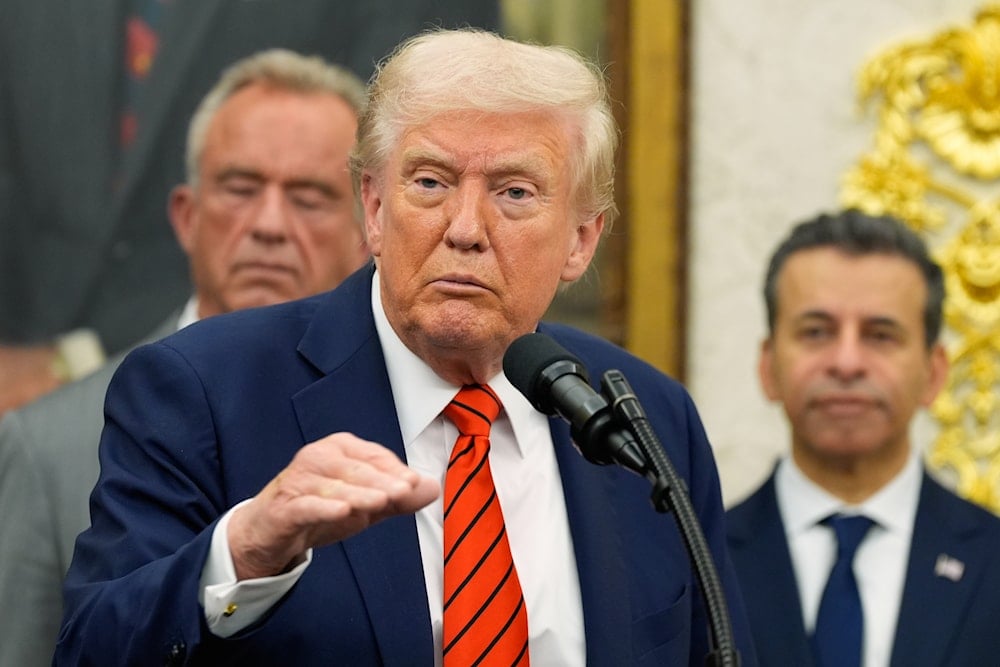Trump, AstraZeneca announce US drug pricing deal at White House
AstraZeneca set to sell some medicines at lower prices through Medicaid and a new TrumpRx platform in return for a three-year US tariff exemption.
-

US President Donald Trump speaks in the Oval Office of the White House, on October 10, 2025, in Washington, as Health and Human Services Secretary Robert F. Kennedy Jr. and Dr. Marty Makary, commissioner of the Food and Drug Administration, listen. (AP Photo/Alex Brandon)
US President Donald Trump announced a new agreement on Friday with UK-based pharmaceutical company AstraZeneca, under which the company will provide discounted medicines through the Medicaid health program in exchange for a three-year tariff exemption. The deal follows a similar agreement reached earlier with Pfizer.
The Trump administration announced that the deal forms part of a broader effort to pressure pharmaceutical companies to reduce drug prices for US consumers, who pay the highest prescription drug prices in the developed world.
As part of the agreement, AstraZeneca will offer certain medications at up to 80% off their list prices through a planned online platform called TrumpRx, which is expected to launch next year. AstraZeneca CEO Pascal Soriot confirmed the company would provide these discounts while benefiting from temporary tariff exemptions to localize the remainder of its product portfolio.
In recent months, Trump intensified pressure on major drugmakers, threatening 100% tariffs on imported medications if companies failed to reduce prices or shift production to the US. Letters sent in July to 17 major pharmaceutical firms demanded price cuts, with AstraZeneca and Pfizer being the first to reach a formal agreement with the administration.
According to the White House, the framework established by these deals will be used to expand similar agreements across the pharmaceutical sector.
Experts question real impact on US healthcare costs
While the administration touted the deal as a step toward lowering consumer costs, experts expressed skepticism over its actual impact, especially within Medicaid, the joint federal-state health program for low-income Americans, which already receives the lowest drug prices in the country.
Craig Garthwaite, a professor at Northwestern University, said AstraZeneca’s drug portfolio does not suggest a major price shift is likely for Medicaid. "I don't think there are a bunch of drugs that exist where that's going to involve them giving a very big discount," he said.
Rena Conti, a health policy expert at Boston University, added that while the deal may benefit the company by avoiding tariffs, its effect on out-of-pocket costs and rising insurance premiums remains limited. "It’s good for the companies, and has very uncertain, if any, benefit for Americans struggling with the affordability of prescription drugs," she noted.
AstraZeneca has increasingly sought to strengthen its ties with the US market. In July, the company announced a $50 billion investment plan to expand manufacturing and R&D across six states, including what will become its largest site globally in Virginia.
In a separate move responding to pricing pressure, the company also pledged in September to sell its diabetes and asthma medications directly to US patients at discounts of up to 70% for those paying out of pocket.
Moreover, CEO Pascal Soriot has emphasized the company’s shift in identity toward its largest market. “We are a very American company,” he said, noting plans to list AstraZeneca shares on US stock exchanges in addition to those in the UK and Europe.

 3 Min Read
3 Min Read










